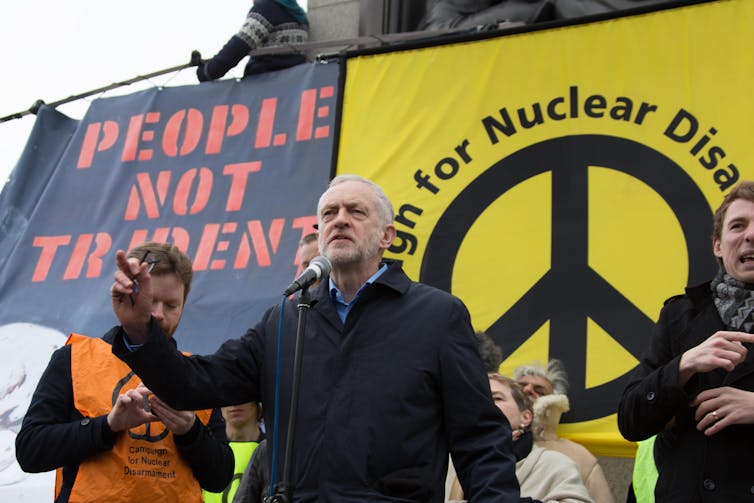With a campaign slogan of “change”, Keir Starmer is on a mission to persuade the electorate that the Labour party of 2024 is different to the one of 2019. Part of this is his unequivocal “triple lock” commitment to Trident, the UK’s nuclear weapon system.
At a time when the risk of a major European war is higher than it has been for decades, Starmer has reiterated his support for a massive programme to replace the Trident system (submarines, warhead, missiles and infrastructure), initiated by former Labour prime minister Tony Blair, in 2006. The triple lock is a commitment to the current programme to build four new ballistic missile submarines, keep one of the four always at sea on operational patrol and keep the system up to date.
Starmer is pushing back against Conservative claims that Labour is “weak”, “cannot be trusted” and is a “danger to national security”, accusations that have plagued his predecessor Jeremy Corbyn, a lifelong opponent of nuclear weapons.
Ideas of British national identity and Britain’s place in the world connect to a commitment to nuclear weapons. This identity is also tied to the idea of Britain as a military power in Europe, and Labour’s current identity of being strong on defence.
Prospective prime ministers are effectively required to publicly declare that they would be prepared to use nuclear weapons. Commitment to nuclear deterrence has become a de facto criterion for entering No 10.
Corbyn found this out in 2017 when he told the BBC’s Andrew Marr he would never use nuclear weapons first, or perhaps ever, if he were prime minister. In an unprecedented intervention, serving and former chiefs of the defence staff said that Corbyn’s response showed he “should not be trusted … with the nation’s defence and security”, and was unfit to be prime minister. Corbyn’s opposition to Trident is still being used to attack Starmer and Labour years later.
Starmer first signalled his commitment to Trident in 2021. Two years later, shadow defence secretary John Healey and shadow foreign secretary David Lammy declared their “unshakable” commitment to nuclear weapons as part of “Labour’s heritage”. But concerns about the morality and efficacy of using nuclear weapons have long divided Labour.
This is quite different to how nuclear weapons, which are based in Scotland, are framed by the Scottish National Party. In their conception of an independent Scotland’s national identity nuclear weapons are associated with imposed, undemocratic, Tory “imperialism” in which Labour has been complicit, and contrary to the SNP’s version of progressive internationalism. The SNP has said they would remove nuclear weapons from Scotland in the event of Scottish independence.
The nuclear debate is also wrapped up in a gendered narrative that sees a commitment to nuclear weapons as strong, sensible, rational and masculine, and anything else as weak, irrational and feminine.
The nuclear ‘consensus’
This Whitehall nuclear consensus closes down democratic debate on if, how and why the prime minister might use nuclear weapons. But views in the country are far from settled.
Recent polling shows 53% supports or strongly supports the UK having nuclear weapons, with about 30% opposed or strongly opposed. For women, the split is 50:50. For under 25s, it is 28% in favour and 43% against. In Scotland it is 35% in favour and 41% against (the rest say they don’t know).
The UK prime minister is one of a handful of people in the world with the power to inflict truly catastrophic levels of violence upon another society. Nuclear weapons should therefore be subject to intense scrutiny and debate, especially in a liberal democratic society. Starmer should appreciate this as a human rights lawyer, since practically any use of nuclear weapons would transgress international humanitarian and human rights law.

The nuclear programme is also hugely expensive. At a time when public services including health and education are under serious pressure, this arguably makes democratic debate even more necessary.
In March 2024 the House of Commons public accounts committee reported that the cost of the Ministry of Defence’s 10-year equipment plan was over budget by £17 billion, despite a budget increase of £46.3 billion. The greatest cause of this was the nuclear programme, where costs have increased by £38.2 billion (62%) since the last plan. The nuclear programme is now 34.5% of the £288.6 billion defence equipment plan, which itself is 49% of the total MoD budget.
In particular, the programme to deliver the new Dreadnought ballistic missile submarines has become the MoD’s highest priority. The department will redirect funds from conventional military programmes to support it if it can’t get more money from the Treasury. Labour and the Conservatives have both committed to increase the defence budget, especially for conventional forces, but have not said where the money will come from.
There are other political reasons why Starmer has come out strong for Trident. In particular, the thousands of jobs that the production and maintenance of nuclear-powered submarines supports in England and Scotland, and the power of the unions in the Labour party. The “triple lock” language also mirrors the triple lock commitment on pensions. This may appeal to older voters, who are more likely to vote (and vote Conservative).
Starmer’s “triple lock” might make sense politically from his perspective, but it is symptomatic of a nuclear consensus in Whitehall politics that brooks little dissent. The result is that debate on these difficult and serious security, economic, legal and moral choices on nuclear weapons routinely gets shut down and reduced to political performance. In the words of retired senior British Army officer General Sir Richard Shirreff, it infantilises a deadly serious issue.

